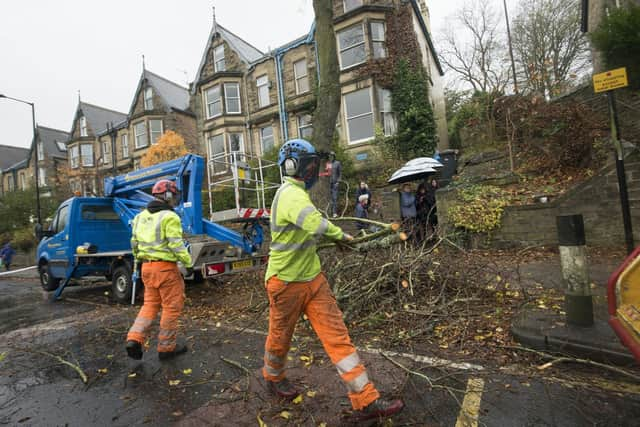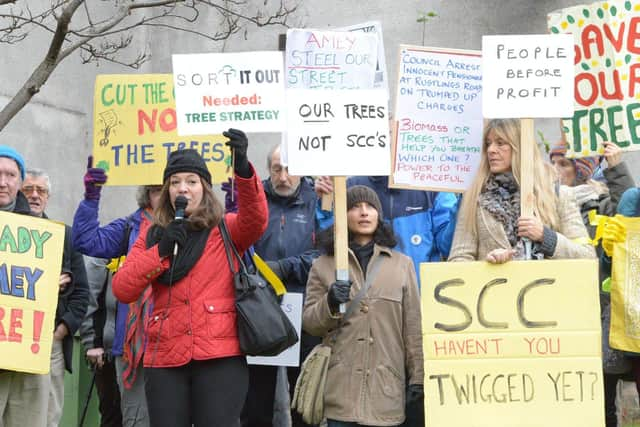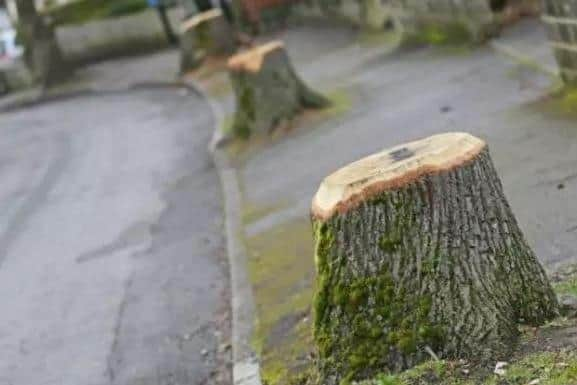‘Flawed from the moment the contract was signed’: inquiry exposes truth about Sheffield tree felling
and live on Freeview channel 276
Sheffield’s ‘chainsaw massacre’ left a lasting scar on the city. What started out as a programme to improve the highways spiralled into one of the most infamous council scandals in history.
The bitter dispute was described by the then communities secretary, Michael Gove, as “bonkers”. In one episode, a woman was arrested for tooting a toy horn and in another, campaigners were accused of ‘poisoning’ cups of tea they gave to workers felling trees.
Advertisement
Hide AdAdvertisement
Hide AdDuring one particularly infamous incident – known as the “dawn raid” on Rustlings Road – council contractors reportedly dragged residents out of their beds at 4.45 am to move their cars to fell trees before protesters arrived. Nick Clegg, then MP for Sheffield Hallam, described it as “something you’d expect to see in Putin’s Russia”.


Protests were fuelled by the council’s actions which went as far as seeking High Court injunctions against campaigners and one of its own councillors.
What the council did was bad but Sir Mark Lowcock, chair of the independent inquiry into the saga, said some of the ideas the council flirted with but did not pursue were even worse.
Sir Lowcock, whose long-awaited report sought “truth and reconciliation”, described it as a “dark episode in Sheffield” as he published his findings this week. He said the council was slow to grasp the reputational damage of the debacle which had become a defining fact about the city, years later.
Advertisement
Hide AdAdvertisement
Hide AdHis 100,000 word report – longer than either of his books – detailed the failings of the Streets Ahead programme that aimed to fell 17,500 street trees as part of the £2.2 billion contract between the council and Amey.


Findings from the inquiry were crystal clear that the council overstretched its authority in taking drastic action against campaigners, had serious and sustained failures in leadership and misled the public, courts and an independent panel it set up to deal with the dispute.
“It lacked transparency and repeatedly said things that were economical with the truth, misleading and in some cases were ultimately exposed as dishonest,” Sir Lowcock said in one of many scathing statements.
Where did it all go wrong?
“The plan for the Streets Ahead programme was…flawed from the moment the contract was signed,” Sir Lowcock said. “The serious dispute that then emerged, however, was not inevitable.”
Advertisement
Hide AdAdvertisement
Hide Ad

The council fell at the first hurdle, misinterpreting analysis the programme was based on and therefore setting out to fell many more trees than needed. Former council leader Liberal Democrat Lord Paul Scriven has now apologised for this, saying he was told “17,500 trees were beyond their healthy and natural life” but he should have checked the raw data.
Later in the design phase, Amey advised against a cost saving proposal from the council to half the number of trees chopped to 8,750.
The authorities also set the scheme up for failure by doing inadequate risk assessments and overlooking “obvious facts” such as people seeing a world of difference between a newly planted tree and a large mature one.
“A consequence of failing to identify the risk was that nothing was done to mitigate it,” Sir Lowcock said.
Advertisement
Hide AdAdvertisement
Hide AdIt was then slow to respond to growing opposition, believing things were “progressing smoothly” and ignoring those who said it needed a political solution.
Instead of trying to find a compromise, Sir Lowcock said the council hardened its approach and tried to “defeat” those who opposed.
He added the council did not consider whether the increasingly drastic action it was taking, and seeking from Amey and the police, was wise.
Amey had increasing misgivings about the council’s approach but went along with it under threat of significant financial penalties.
Advertisement
Hide AdAdvertisement
Hide AdSir Lowcock said: “The council stretched the proportionate use of its authority beyond reasonable limits…the council’s behaviour amounted to a serious and sustained failure of strategic leadership. Responsibility for that ultimately rests with the political leadership, in particular the relevant cabinet member and the council leader.”
He said public trust and confidence was eroded in ways that went beyond the tree row.
Impact
It caused lasting damage not only to the city’s reputation and environment but also the mental health of those caught up in the events.
Graham Turnbull, who was subject to an injunction by the council, said: “It was a scary time for many of us. We were threatened with court action that could bankrupt us, we were threatened with prison if we broke the injunction. Now we find that our city council was dishonest as well as badly led. I hope this causes other public authorities to take a lot more care with their plans and understand that citizens often know what’s best for their streets.”
Advertisement
Hide AdAdvertisement
Hide AdChristine King, former co-chair of Sheffield Tree Action Group, added: “The thing that angers me most apart from the needless destruction of our green heritage is the colossal long term emotional damage caused by the failure of a few to admit that they were wrong in the first place.”
A chapter in the report details the harm caused by the situation such as rising sick leave, stress and lasting mental health issues among council and Amey staff.
Junior and senior staff reported being harassed online and confronted in the street, shopping and at parks while with their children. Some said it made it more difficult to find other jobs.
Current council leader Terry Fox, who was head of the programme for a year in 2015/16, said it was a “hellish time”.
Advertisement
Hide AdAdvertisement
Hide AdCampaigners also said the intense emotions of attending the protests followed them home, leading to stress, poor sleep and other health issues. One protester said in their testimony that it took more than a year not to flinch at the sight of hi-vis gear.
“The dispute did significant harm,” Sir Lowcock said. “Thousands of healthy and much loved trees were lost. Many more could have been. Sheffield’s reputation was damaged. Public trust and confidence in the council was undermined. It has not been fully rebuilt.
“And people on all sides suffered anxiety, stress, injuries, wider physical and mental health problems and other harms which some continue to carry. This would have been evident to anyone who watched the inquiry’s public hearings and was even clearer from our private discussions.”
What now?
As per the terms of reference, everyone – including the council – was given the report at the same time.
Advertisement
Hide AdAdvertisement
Hide AdGiven the length of the report, the council said it was taking time to digest it.
Kate Josephs, chief executive, said it was undecided whether disciplinary action would be taken.
She said all recommendations would be implemented and it was important to personally apologise to a number of people in a thoughtful way. Amey has also apologised.
Sheffield Liberal Democrats and some campaigners called for councillors Fox and Bryan Lodge, who was head of the programme during the height of the controversy, to resign.
Advertisement
Hide AdAdvertisement
Hide AdBut Coun Fox said he would stay and rejected Coun Lodge’s offer to resign.
The report states if there was no campaign to oppose what the council was doing, at least 10,000 more trees would have been chopped down.
Reacting to the report, Judy Stewart, a campaigner who spent long hours protesting tree felling, said: “This is a very emotional day for me. We spent huge amounts of time on the street, often in freezing weather, facing the intimidation of large numbers of police and security guards. It’s such a relief to discover that it was all worthwhile and we may have achieved a lasting change in Sheffield and maybe in other towns and cities.”
Richard Ward, co-chair of Sheffield Tree Action Group, said many people would be feeling relieved and vindicated.
Advertisement
Hide AdAdvertisement
Hide AdHe said they would continue working with the council to rebuild trust, explore reparation and ensure it never happens again.
As warned in the report, there are still 14 years left of the contract.
The council reiterated it would fulfil the three sets recommendations set out.
These focus on: reconciliation and apologising, future risks with the remaining 14 years of the contract, and wider problems with the council that go beyond the tree dispute.
Advertisement
Hide AdAdvertisement
Hide AdThe full report can be found on the council’s website here: https://www.sheffield.gov.uk/your-city-council/independent-inquiry-into-street-trees-dispute#:~:text=Following%20the%20signing%20of%20the,report%20on%206%20March%202023.